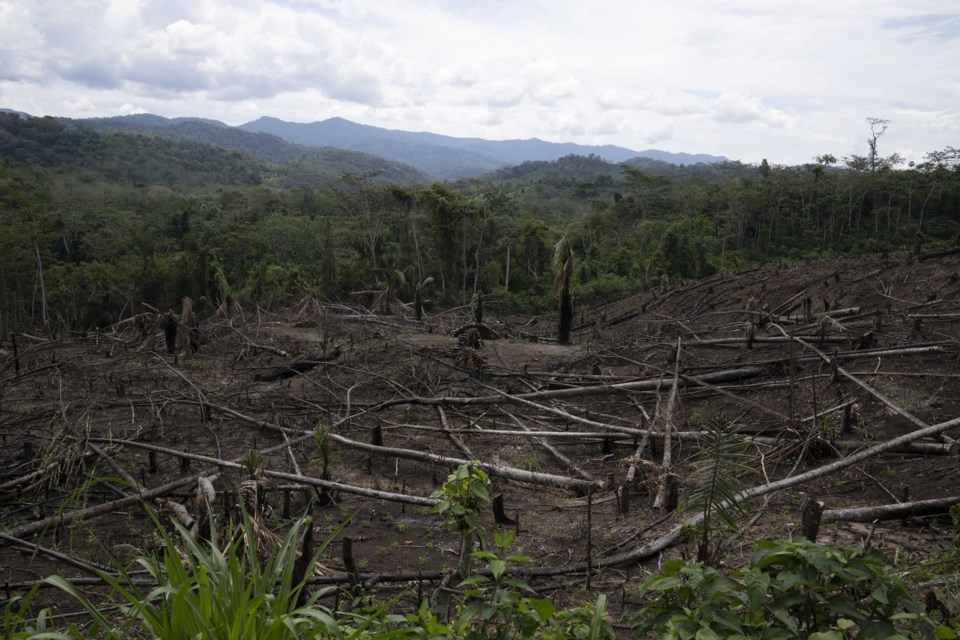BOGOTA, Colombia (AP) — A recent amendment to Peru’s Forestry and Wildlife Law is drawing fierce backlash from environmental groups and Indigenous groups that warn it could accelerate deforestation in the Amazon rainforest under the guise of economic development.
The amendment eliminates the requirement that landowners or companies get state authorization before converting forested land to other uses. Critics say the change could legitimize years of illegal deforestation.
“To us, this is gravely concerning,” said Alvaro Masquez Salvador, a lawyer with the Indigenous Peoples program at Peru’s Legal Defense Institute.
Masquez added that the reform sets a troubling precedent by “effectively privatizing” land that Peru's constitution defines as national patrimony. “Forests are not private property—they belong to the nation,” he said.
Supporters of the amendment, enacted in March, say it will stabilize Peru’s agricultural sector and provide farmers with greater legal certainty.
The Associated Press sought comment from multiple representatives of Peru’s agribusiness sector, as well as Congresswoman Maria Zeta Chunga, a vocal supporter of the law. Only one person in the agribusiness sector responded, saying they did not want to comment.
A legal reversal and unconstitutional amendments
Peru holds the second-largest share of Amazon rainforest after Brazil, with over 70 million hectares—about 60% of Peru's territory, according to nonprofit Rainforest Trust. It’s one of the most biodiverse regions on the planet and home to more than 50 Indigenous peoples, some living in voluntary isolation. These communities are vital guardians of ecosystems and the rainforests they protect help stabilize the global climate by absorbing large quantities of carbon dioxide, a greenhouse gas that is the main driver of climate change.
Passed in 2011, the original Forestry and Wildlife Law required state approval and environmental studies before any change in forest land use. But recent reforms have steadily weakened those protections. The latest amendment allows landowners and companies to bypass that approval, even retroactively legalizing past deforestation.
Peru’s Constitutional Court upheld the amendment after a group of lawyers filed a constitutional challenge. Although the court struck down some parts of the amendment, it left intact the law’s final provision, which validates past illegal land-use changes. Legal experts say this is the most dangerous part.
In its ruling, the court acknowledged that Indigenous communities should have been consulted on reforms to the law and affirmed the Environment Ministry’s role in forest zoning.
Environmental lawyer César Ipenza summed it up like this: “The court admits the law violated Indigenous rights and (tribes) should have been consulted but it still endorses the most harmful part.”
Support from powerful alliances in agribusiness
The push behind the reform mirrors dynamics seen under former President Jair Bolsonaro in Brazil, where political and economic forces aligned to weaken environmental protections to favor agribusiness. While Brazil’s effort was led by a highly organized, industrial agribusiness lobby, Peru’s version involves a looser but powerful coalition.
In Peru, support comes from agribusiness interests, land grabbers and figures linked to illegal mining and drug trafficking. Small and medium farmers with concerns about securing their land have also been swept into the effort.
“What we’re seeing is a convergence of both legal and illegal interests,” said Vladimir Pinto, the Peru field coordinator for Amazon Watch, an environmental advocacy group.
Was amendment push to comply with EU regulations?
Julia Urrunaga, Peru director at nonprofit Environmental Investigation Agency, warned that the Peruvian government is now “falsely arguing” that the amendments are necessary to comply with the European Union’s regulations, which will soon require companies importing products like soy, beef, and palm oil to prove their goods were not sourced from illegally deforested land.
If products tied to illegal deforestation are later legalized and allowed into the market, that will weaken the effectiveness of demand-side regulations like those in the EU, she said.
“This sends the wrong message to global markets and undercuts efforts to curb deforestation through trade restrictions,” Urrunaga said.
Olivier Coupleux, head of the Economic and Trade Section of the EU in Peru, has denied that recent changes to the law are linked to the EU’s deforestation-free regulation.
In interviews with Peruvian media, Coupleux has said the regulation aims to prevent the purchase of products linked to deforestation and does not require legal reforms, but rather traceability and sustainability in goods like coffee, cocoa, and timber.
Peru's Indigenous communities say their communities are threatened
With no further recourse in domestic courts, civil society groups are preparing to take the case to international tribunals, warning that the ruling sets a dangerous precedent for other countries seeking to circumvent environmental law under the banner of reform.
For many Indigenous leaders, the law represents a direct threat to their territories, communities, and ways of life.
Julio Cusurichi, board member of the Interethnic Association for the Development of the Peruvian Rainforest, said the measure will embolden land-grabbing and worsen environmental oversight in already vulnerable areas.
“Our communities have historically protected not just our lands but the planet,” Cusurichi said.
__
The Associated Press’ climate and environmental coverage receives financial support from multiple private foundations. AP is solely responsible for all content. Find AP’s for working with philanthropies, a list of supporters and funded coverage areas at .
Steven Grattan, The Associated Press




